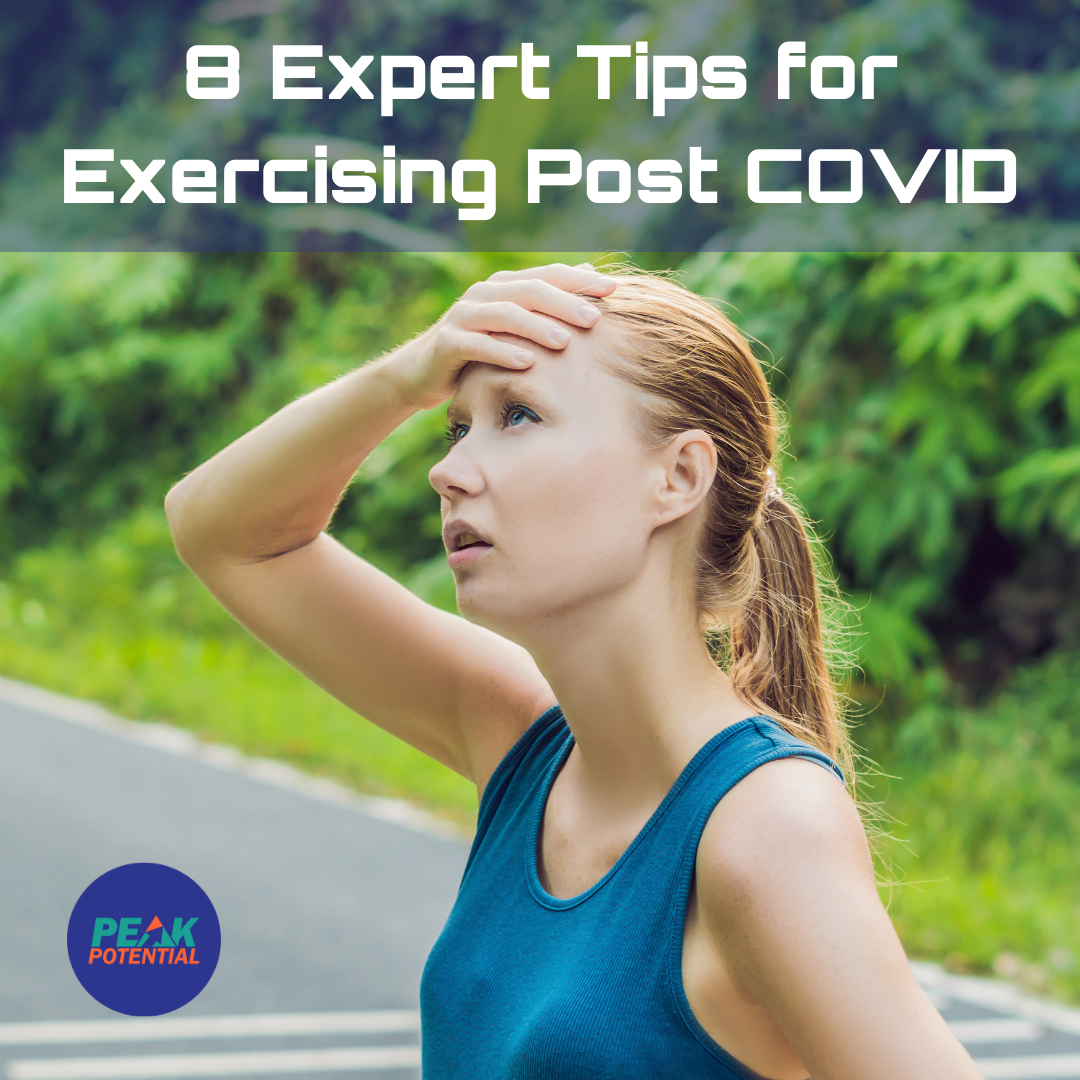There is still so much that we don’t know about the impact of the coronavirus. One thing is certain, from the research and our first hand experience, millions of adults have had to change the way they exercise post COVID.
If you currently have COVID-19, the general recommendation is to wait two weeks before exercising. This period of rest will allow your body to fight the infection and reduce your risk of complications such as myocarditis (inflammation in the heart).
What do you do after two weeks have passed? I hate to say it, but it depends. Many people can resume their usual activities with no problem. Others require more time and additional precautions. And we see many people still struggling months later.
Lingering symptoms, including coughing, fatigue, an irregular heart rate, shortness of breath, aches, or pains can indicate long COVID (or long haulers) syndrome. If this is you, it’s time to discuss with your healthcare provider what the most safe and effective strategy is for you. As doctors of physical therapy, we are qualified to make these recommendations and guide you on this journey.
In general, the best place to start is with walking. It’s low impact and you are completely in control in how hard you push or how often you rest. It will begin to strengthen your muscles, including your heart. However, just a walk around the block can be a struggle for many so let’s get more specific about the safest way to get back to moving.
Tips to resume exercise post COVID:
- Access Your Risk. The effects of COVID-19 vary widely, but are likely at low risk of exercise complications if you’re under 50 with no chronic conditions and had a mild case. Otherwise, check in with your healthcare provider to access if further testing is necessary.
- Start out small. Once you’re able to resume your daily activities, start with a walk on a flat surface. Give yourself a break and allow your body to rest if you feel fatigued or short of breath. If you have difficulty making progress from this point, a post COVID rehab program is the next best step.
- Check your posture. Working on postural strength and efficient movement allows you to maximize energy and protect yourself from injuries. During walking or exercise, keep your head up and firm through your core muscles. Keep yourself in a position that allows you to breathe easily.
- Practice Breathing. Use your lungs and reduce stress with pursed lip and diaphragmatic breathing exercises. This increases oxygen transport to your muscles for increased endurance and decreased soreness. Consider hyperbaric oxygen therapy if fatigue or endurance is problematic for you.
- Spend time outdoors. Time outside allows you to get moving, increase vitamin D, and enhances mental health. Do not underestimate the power of mental health in the process of recovery and performance. Pick a scenic route where you can enjoy fresh air, and green spaces.
- Pace Yourself. Allow yourself to ease back into physical activity. Divide your workout into brief sessions of just 10 minutes. Try riding a bike or a rowing machine if weight bearing activities cause too much fatigue. Yoga and Pilates can be ideal movement practices if endurance is low.
- Set goals. Increase your speed or distance a little each week working toward a larger goal. When you’re ready, climb up hills, or pump your arms more. If you hit a plateau in your progress and are unable to return to your prior level of fitness it’s time to get some expert guidance.
- Seek out support. Listen to your body, so you can avoid pushing yourself too hard. Most people will be able to slowly progress back into their fitness routine, but some will find long COVID symptoms continue to limit them for months or even years.
When it comes to exercise post COVID, and goals to regain your fitness, it is not a matter of working harder but working smarter. Nutritional strategies, breathing techniques, postural training, supplementation, compression therapy, and oxygen treatments can set you up for success. That may sound like a lot of effort, but the results will be worth it.
We have a team of experts here to support you when you feel stuck. Even when the doctor doesn’t have a clear answer to why you still don’t feel well so long after recovery from your initial COVID illness, you can maximize your changes of a full recovery. A well researched and personalized rehab plan will protect your long term health and the lifestyle you love.
Visit the Long COVID Rehab page on our website or schedule a phone consult for more information.
If you have had a setback from an illness or injury, consider Integrative Health Coaching as your next best step. Learn more HERE.


